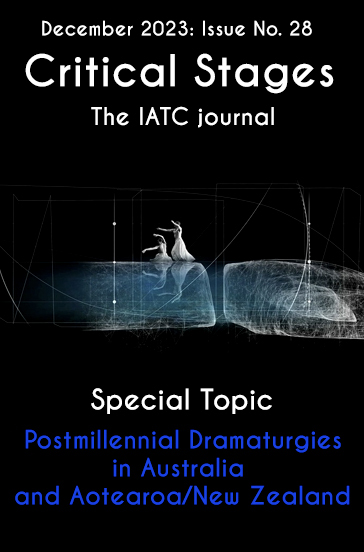Journal Publication - Special edition on Australian and Aotearoa/New Zealand dramaturgy in Critical Stages
| Type of post: | Association news item |
| Sub-type: | No sub-type |
| Posted By: | Kathryn Kelly |
| Status: | Current |
| Date Posted: | Mon, 15 Jan 2024 |
We are very pleased to announce that the special edition on Australian and Aotearoa / New Zealand dramaturgy in Critical Stages co-edited by myself, Julian Meyrick, Fiona Graham, Moana Nepia and Emily Coleman has been published!
https://www.critical-stages.org/28/ (issue #28).
As far as we know, this is the first dedicated special edition of a journal on Australian and Aotearoa / New Zealand dramaturgy.
Critical Stages is open access and we hope it will be an invaluable resource for theatre scholars and practitioners alike.

https://www.critical-stages.org/28/ (issue #28).
As far as we know, this is the first dedicated special edition of a journal on Australian and Aotearoa / New Zealand dramaturgy.
Critical Stages is open access and we hope it will be an invaluable resource for theatre scholars and practitioners alike.

To quote from our editorial, By Land and Sea: Wayfinding and Weaving Contemporary Australian and Aotearoa/New Zealand Dramaturgies:
“This special edition of Critical Stages/Scènes critiques aims to build on scattered accounts of Australasian dramaturgy across national and international publications over recent decades to provide a timely focus on the field now. Adopting a place-based curation approach, it attempts to embrace the full spectrum of Australian and Aotearoa/New Zealand theatre culture, incorporating First Nations and Māori live performance practices, as well as the modern settler, post-colonial drama of both nations. Within this complex narrative, Australasian dramaturgy has a history filled with contention, paradox, improvisation and passionate practice. It is narrative that as editors, inevitably, we selectively excerpt rather than comprehensively represent.
We also seek to honour the primacy and distinctive nature of First Nations and Māori cultural practices and scholarship. In collating the articles presented, we were supported by the appointment of cultural consultants to ensure the agency of First Nations and Māori perspectives in the curatorial process.”
As Turner and Behrndt note in their seminal work, Dramaturgy and Performance,“ dramaturgy is as diverse as performance-making itself” (17). We adopt an inclusive conception of dramaturgy as drawn from existing Australasian scholarship and global dramaturgical research, while recognising it is a specialised field of professional knowledge, with shared approaches and objectives that sit alongside distinctive patterns of work. This broad-church outlook allows for different currents of dramaturgical theory and practice to co-exist in their contradictions and challenges without invalidating potential commonalities that might arise from their distinctive Australasian context. What these are we leave for readers to discern.”
Thank you all again, and very Happy New Year!
Kath, Julian, Fiona, Moana and Emily
| For more information, see: | https://www.critical-stages.org/28/ |


